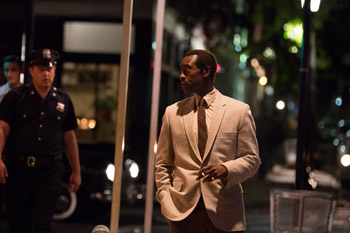Don Cheadle Miles Ahead Interview
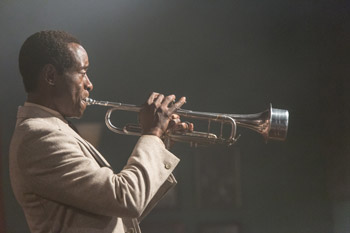
Don Cheadle Miles Ahead Interview
Cast: Don Cheadle, Ewan McGregor, Emayatzy Corinealdi, Lakeith Lee Stanfield, Michael Stuhlbarg
Director: Don Cheadle
Genre: Biopic, Drama
Rated: M
Running Time: 101 minutes
Synopsis: Miles Ahead, inspired by events in his life, is a wildly entertaining, impressionistic, no-holds barred portrait of one of 20th century music's creative geniuses, Miles Davis, featuring a career defining performance by Oscar nominee Don Cheadle in the title role. Working from a script he co-wrote with Steven Baigelman, Cheadle makes his bravura directorial debut.
In the midst of a dazzling and prolific career at the forefront of modern jazz innovation, Miles Davis (Cheadle) virtually disappears from public view for a period of five years in the late 1970s. Alone and holed up in his home, he is beset by chronic pain from a deteriorating hip, his musical voice stifled and numbed by drugs and pain medications, his mind haunted by unsettling ghosts from the past.
A wily music reporter, Dave Braden (Ewan McGregor) forces his way into Davis' house and, over the next couple of days, the two me
n unwittingly embark on a wild and sometimes harrowing adventure to recover a stolen tape of the musician's latest compositions. Davis' mercurial behavior is fueled by memories of his failed marriage to the talented and beautiful dancer Frances Taylor (Emayatzy Corinealdi). During their romance and subsequent marriage, Frances served as Davis' muse. It was during this period that he released several of his signature recordings including the groundbreaking 'Sketches of Spain" and 'Someday My Prince Will Come."
The idyll however, was short lived. The eight-year marriage was marked by infidelity and abuse, and Frances was forced to flee for her own safety as Miles' mental and physical health deteriorated.
By the late -70s, plagued by years of regret and loss, Davis flirts with annihilation until he once again finds salvation in his art.
Miles Ahead
Release Date: May 5th, 2016
The Making Of Miles Ahead
"To make an entertaining, "rock and roll" movie about a multi-talented musician in a non-traditional, subversive way. To attempt to DO Miles Davis rather than simply chronicle the highlights and low-lights of his life. That process felt like Miles to me." Don Cheadle
After several setbacks, including one of the largest recessions in global history, Don Cheadle's Miles Ahead finally locked down partial financing before turning to IndieGoGo to raise the funds to make up for the shortfall. 'It actually felt right that we used a social platform to complete the film," observes Don Cheadle, 'since Miles was someone who made -social music.'"
The stop and start financing, however, was not the only hurdle for the low-budget project. Many of Don Cheadle's co-stars in the film, including Ewan McGregor, Michael Stuhlbarg and Emayatzy Corinealdi, had limited windows of availability before they had to depart for other commitments. 'We only had Ewan McGregor and Michael Stuhlbarg for three weeks and Emayatzy for three weeks, so we had to complete all their sequences in the film during that period," says Don Cheadle. 'We had to get it right the first time. No second bites of the apple."
Though set mostly in New York, Miles Ahead was filmed mostly in Cincinatti, Ohio and Don Cheadle commends the city filmmaking commission for 'pulling out all the stops. Only three features have ever been shot there and we were very lucky because they had recently wrapped Todd Haynes' film Carol and they were in a good place. Still, there were days when we had two cameras and only one operator available, because the other was working on another project. We also didn't have use of the Steadicam for the first week. But fortunately everyone was totally committed."
Producer Pamela Hirsch also has kind words for Cincinatti's film commission, particularly its cooperation during one of the film's set pieces, a frantic car chase. 'We knew it was going to be challenging," says Pamela Hirsch, 'but when you want to take over the streets, it helps to have a city that is happy to have you there. It just makes it easier."
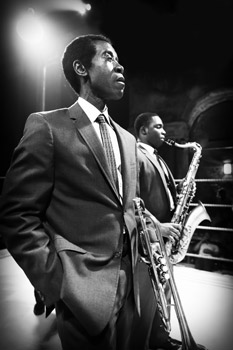 Given the complexity of the sequence, it had to be completely planned out on storyboards, she says. 'It was all there on the page and we knew the stakes, the pace and the action and, like much of the film, we wanted to push the envelope," says Pamela Hirsch. 'And to do that, first we had to carefully map it out."
Given the complexity of the sequence, it had to be completely planned out on storyboards, she says. 'It was all there on the page and we knew the stakes, the pace and the action and, like much of the film, we wanted to push the envelope," says Pamela Hirsch. 'And to do that, first we had to carefully map it out."
In addition to being a first-time director, Don Cheadle is also in every scene in the film, so his preparation had to be meticulous and he needed a top flight crew, which in addition to Pamela Hirsch and her producing partner Lenore Zerman included director of photography Roberto Schaefer (Quantum Of Solace, Finding Neverland), production designer Hannah Beachler (Fruitvale Station), costume designer Gersha Phillips (House Of Cards, Life), editor John Axelrad (The Immigrant, Crazy Heart), sound designer/sound editor Skip Lievsay (several Coen brothers movies including No Country For Old Men), and composer Robert Glasper.
'Don Cheadle knew it was going to be complicated, so he arrived well prepared and hired the right team and had a lot of trust in them," says Pamela Hirsch. 'It was a passion project across the board and Don Cheadle was one-hundred-percent open to ideas. It was a completely creative environment from top to bottom."
Don Cheadle and Baigelman's script was visually oriented and keyed to certain music cues, which made for a unique read, according to Pamela Hirsch. 'The script was like a piece of music. I would get calls from crew members telling me that when they read it in conjunction with the piece of music that would be used, it changed the whole experience. It enabled them to visualize the pacing of the script because everything flowed like a piece of music."
The sound of the film is rich and layered and seamless, says Pamela Hirsch. 'Anytime you have Miles Davis scoring a movie, you're in the hands of a master." In addition to Davis' compositions, the underscoring includes original music by Glasper and sound design by Lievsay that flow effortlessly around and through each other.
As an entertainment, Pamela Hirsch concludes, Miles Ahead is engaging and enjoyable purely as filmmaking, a treat both for aficionados of Miles Davis's life and music as well as audiences who know very little about him. 'Ewan McGregor, Michael Stuhlbarg has created a film that is truthful to Miles' spirit, a film he would have starred in. He was a complex character who lived a fascinating life, and it's all in there."
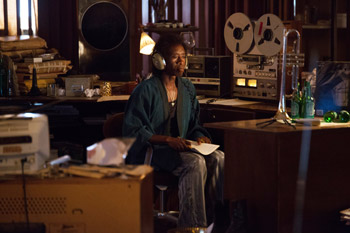 Interview with Don Cheadle
Interview with Don Cheadle
Question: Who was Miles Davis and why did you feel compelled to make a movie about him?
Don Cheadle: I've been steeped in Miles Davis' music since the age of ten. He is so many things, not the least of which is an indefatigable symbol of creative energy and power; someone who was never afraid to step out of his comfort zone; someone who was totally uncomfortable with stasis. Over the years I was approached by various people, some of whom were close to Miles and others who just wanted to see a movie about him; and they said that if anyone should play him it was me. I'd already been in a number of standard bio-pics and I had no interest in making another since I found them full of contrivances and fabrications. You know, 'based on a true story." Shortly after Miles was inducted into the Rock and Roll Hall of Fame I was approached by his family. They pitched me several different takes but I didn't spark to any of them. To me, they didn't go far enough in trying to capture his enormous creativity and dynamism. So we shook hands and promised to keep in touch. As I pondered it further, I began to imagine a film that would capture Miles as who he was, a man full of drive and forward momentum but also mercurial and dangerous, the real O.G. original gangsta. And I realised that it would never happen unless I wrote it. So I asked the family if they were okay with that and they said 'Cool. Do it."
Question: There are at least five feature length movies that could be made about Miles Davis' incredible life. Why do you think it took so long to make just one?
Don Cheadle: A big reason is that jazz has been swept into a corner and no longer seems to have relevance to a modern audience. Miles still has great name recognition and 'Kind of Blue" still sells more than 50,000 albums a year. But while most people I asked recognized that he was a jazz musician, they didn't know he played the trumpet and many confused him with Dizzy Gillespie. -Oh yeah, you mean the guy who blew out his cheeks.'
Miles' music is not immediately identifiable like some oldie rock hit. You can't sing it. It isn't over in three minutes. Unless people hear it on the radio, they have no connection to it. Another reason is that music appreciation is no longer taught in public schools.
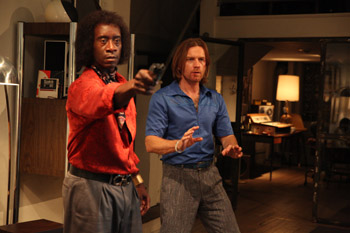 So when a studio looks at a movie like that all they see is: period piece, black, jazz, niche, hard sell, no foreign appeal.
So when a studio looks at a movie like that all they see is: period piece, black, jazz, niche, hard sell, no foreign appeal.
Question: Rather than a conventional bio-pic, you chose a pivotal point in his life to illuminate his past and hint at his future. Tell us about that decision.
Don Cheadle: It was a stop and start process, setting up deals, working with writers, and having deals fall apart after the financial collapse of the economy. I tried to give the project away to other directors, figuring that an established name could help move the project forward. But we always seemed to end up back at square one.
Because that's who Miles was. He never looked back, always forward. He was innovative and prolific and his style was always changing. And yet, for a five year period in the late -70s, he was stymied, blocked and frustrated. That crisis period seemed to be a great entry point. You don't have to know anything about jazz to understand the dilemma. A prolific artist stopped creating for five years. What was that all about?
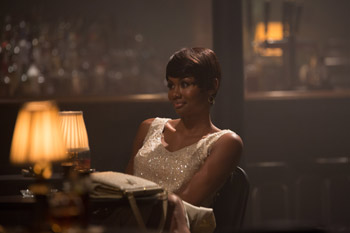 Like Miles' music, the structure Steve and I decided on for the narrative is modal. It's as much a composition as any of Miles' recordings. It's loose and impressionistic. It is also metaphoric. The sections of the film that focus on his relationship with Frances Davis (Emayatzy Corinealdi) are a comment on the main story that takes place in 1979 when Miles is plagued by a writer's block and deteriorating hip and using drugs to numb the pain. Frances represents his muse, the voice he has lost and is trying to recapture. The audio tape he loses in the 'present" scenes also represent the loss of a relationship, the relationship to his music. Even the character of Junior (Keith Stanfield), the talented young trumpet player he meets, echoes his complex relationship to the past. As a young musician, Miles was called 'junior" by Charlie Parker and Dizzy Gillespie, a nickname he hated, by the way.
Like Miles' music, the structure Steve and I decided on for the narrative is modal. It's as much a composition as any of Miles' recordings. It's loose and impressionistic. It is also metaphoric. The sections of the film that focus on his relationship with Frances Davis (Emayatzy Corinealdi) are a comment on the main story that takes place in 1979 when Miles is plagued by a writer's block and deteriorating hip and using drugs to numb the pain. Frances represents his muse, the voice he has lost and is trying to recapture. The audio tape he loses in the 'present" scenes also represent the loss of a relationship, the relationship to his music. Even the character of Junior (Keith Stanfield), the talented young trumpet player he meets, echoes his complex relationship to the past. As a young musician, Miles was called 'junior" by Charlie Parker and Dizzy Gillespie, a nickname he hated, by the way. Question: The film seems to operate on two speeds. The present scenes are fast and dangerous, while his past is cooler, more controlled and often romantic. Was that a conscious decision?
Don Cheadle: Absolutely. They counterpoint one another. But gradually, the two periods move together. His recollections of Frances, like his music, are cool and controlled, romantic and seductive, as opposed to his self-destructive present, which is completely out of control. But as we move forward in his relationship to Frances, the romantic scenes get more jangly and chaotic because Miles can no longer control the narrative. As he reflects on that period, he is finally forced to admit that his abusive behavior led to the destruction of that relationship and contributed to his current creative roadblock. He can no longer lie to himself. In letting go of that lie, he regains his music. But at the same time he loses his muse. In the end, he realizes that he can't have both.
Question: How did Miles' evolving styles of jazz influence the directing?
Don Cheadle: A big motivator for me was to create a methodology that would allow me to use music from all periods of Miles' career; that would enable me to externalize his interior conflict. We used music from every era and every style of Miles' life and we wrote and shot the scenes to that music. We didn't hamstring ourselves by only using pieces from one particular era because throughout his life, Miles wrote soundtrack. His music reflected the era in which he wrote it, but was often ahead of the period. He hated the term jazz. He preferred 'social music."
We let the storytelling dictate what piece of music we'd use. Sometimes it was part of the period, like when we used 'Nefertitti' behind the scene where Miles and Frances quarrel. The record is playing in the scene and we just let it play throughout and it made the sequence so much more painful and poignant than hearing the specifics of the argument.
In the boxing scene, set in the -present,' we use 'So What" (originally from the album 'Kind of Blue") from his Tokyo and Bootleg sessions (both from the 1960s), because it was the perfect piece for that sequence. The structure of the movie allowed us to use different styles, including rock and funk and electric, rather than doing a sequential 'greatest hits" soundtrack.
Question: Davis was married several times, but you chose to explore his years with the dancer Frances Taylor. Why?
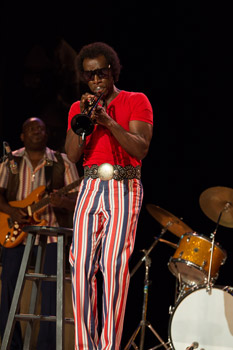 Don Cheadle: Frances was with Miles in what I call the 'So What" era, his traditional emblematic jazz music and both the relationship and that style of music came to an end when the marriage fell apart. He had taken that music as far as he could push it and after that he didn't play it anymore. Also, Frances was significant in his life, a period of romance and connection. Then he tries to lock her down and she walks out. Having her and losing her became a symbol for his loss of musical expression. No more music for Miles was death. And only when he finally acknowledges what he's done, is he able to break through that block and take off again and grow and move forward.
Don Cheadle: Frances was with Miles in what I call the 'So What" era, his traditional emblematic jazz music and both the relationship and that style of music came to an end when the marriage fell apart. He had taken that music as far as he could push it and after that he didn't play it anymore. Also, Frances was significant in his life, a period of romance and connection. Then he tries to lock her down and she walks out. Having her and losing her became a symbol for his loss of musical expression. No more music for Miles was death. And only when he finally acknowledges what he's done, is he able to break through that block and take off again and grow and move forward. Question: As with many great artists, the film seems to suggest that miles' genius sometimes bordered on a kind of madness.
Don Cheadle: Absolutely. He couldn't shut it off. Music was constantly in his head. The one place I show that is the scene in which he and Frances make love and afterwards he is watching her dance. And then suddenly he's gone. She finds him downstairs playing the inspiration he just got from her into the trumpet. He was always composing in his head.
Miles was a restless soul. He always had to be doing something. If it wasn't music, he would box or he'd do blow or he'd cook. He could not sit in it, couldn't stop moving, couldn't stop doing. He'd change his clothes or paint or tinker on the piano. He was constantly agitated. When he played music, it gave him an outlet. When he stopped, the energy fed on itself, sometimes destructively so.
Miles was completely mercurial. I think today he'd be analyzed as bi-polar. One minute he'd get angry and punch you out, and the next he'd pour you a drink and sit down beside you to chat as if nothing had happened.
Question: Tell us a bit about the development of the script.
Don Cheadle: The main problem as with all biographical films was what to include and what to leave out. At first we asked ourselves, should we talk about Coltrane, do should we talk about Quincy Jones? I mean, how do you show musical genius?
Ultimately, we decided to focus on depicting an artist going fallow. Again I took my cue from Miles' music. Instead of a reverential bio, I
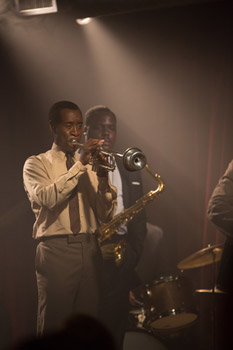 wanted to push it every way I could, go out on a limb and take a risk. Like bringing in the character of Junior, who is actually Miles. And Junior's wife is Miles' first wife, Irene. Through that character Miles gets to see the young Miles. But we don't underline it. Only if you know Miles' life do you understand that it's him.
wanted to push it every way I could, go out on a limb and take a risk. Like bringing in the character of Junior, who is actually Miles. And Junior's wife is Miles' first wife, Irene. Through that character Miles gets to see the young Miles. But we don't underline it. Only if you know Miles' life do you understand that it's him. Question: Though the musical performances are Miles Davis' you play the trumpet like a pro. Did it take long to develop the proper breath and manual control of the instrument?
Don Cheadle: As a kid, back in fifth grade, I played the alto sax and I would listen to people like Charlie Parker and try to figure out how they were playing. It was much easier then to slow down a 78 record on a hi-fi to 33. Once I committed to learning the trumpet for the film, I played every day and still do. I've become completely geeky about it. I'd say I've gotten to the level of a good ninth-grade trumpet player.
The trumpet is a completely different instrument but it makes more sense to me than the sax. I understand the octaves and arpeggios better, but maybe that's the benefit of being 48 and not 18. I watched film and video of Miles and I also had seen him perform in the early 80s shortly after the period in the film. Wynton Marsalis who is a good friend also helped. He said -I know every great Miles solo. So anything you need just ask.' Wynton was a great help. He even sent me my first trumpet.
I learned all the solos for the performance scenes in the movie and the band behind me learned how to play -Miles Ahead.' I felt we needed to learn how to play it in order to understand it. That's me playing and the band too, only you're not hearing our sound.
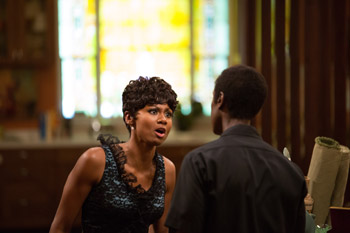 Question: You disappear so completely into the character of miles that it makes one wonder whether you directed the movie as him, rasp and all.
Question: You disappear so completely into the character of miles that it makes one wonder whether you directed the movie as him, rasp and all. Don Cheadle: I did and I stayed in it for as long as I could, but sometimes I would have to come out of character in order to be heard. People used to call Miles -chief,' because he was always running the show. In directing, I connected myself to that part of Miles. I figured if I was going to depict who he was, I would have to do it the way Miles would have done it. Like learning the trumpet, I took it as far as I could. If I thought a scene was too conventional and I wasn't scared, I knew I had to go here. Herbie Hancock and Wayne Shorter (who appear in the -concert' at the end of the film) said it was the only way to tell Miles' story. His family did as well.
Question: The concert sequence that ends the film is not an actual Miles Davis concert but what you call a -meta concert.' explain your decision to end the film that way.
Don Cheadle: The group we put together included older musicians Miles had played with like Herbie and Wayne as well as newer jazz performers like Esperanza Spaulding and Gary Clark Jr. It's exactly the kind of group Miles might put together, a collage, very free form, almost like watching a rehearsal that's open to the public.
With the family's permission, I used Miles' paintings as a backdrop. But like the music, we manipulated them, almost like visual sampling. Again, it's what Miles would have done. Before rap he was already doing sampling in his music, the only difference is that it was analog instead of digital.
Miles Ahead
Release Date: May 5th, 2016
MORE
- Mission: Impossible Fallout
- Glenn Close The Wife
- Allison Chhorn Stanley's Mouth Interview
- Benicio Del Toro Sicario: Day of the Soldado
- Dame Judi Dench Tea With The Dames
- Sandra Bullock Ocean's 8
- Chris Pratt Jurassic World: Fallen Kingdom
- Claudia Sangiorgi Dalimore and Michelle Grace...
- Rachel McAdams Disobedience Interview
- Sebastián Lelio and Alessandro Nivola...
- Perri Cummings Trench Interview

